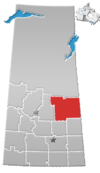Rural Municipality of Torch River No. 488
Torch River No. 488 | |
|---|---|
| Rural Municipality of Torch River No. 488 | |
 Location of the RM of Torch River No. 488 in Saskatchewan | |
| Coordinates: 53°24′18″N 104°19′44″W / 53.405°N 104.329°W[1] | |
| Country | Canada |
| Province | Saskatchewan |
| Census division | 14 |
| SARM division | 4 |
| Formed[2] | January 1, 1950 |
| Government | |
| • Reeve | Jerry Kindrat |
| • Governing body | RM of Torch River No. 488 Council |
| • Administrator | David Yorke |
| • Office location | White Fox |
| Area (2016)[4] | |
| • Land | 5,178.9 km2 (1,999.6 sq mi) |
| Population (2016)[4] | |
• Total | 1,471 |
| • Density | 0.3/km2 (0.8/sq mi) |
| Time zone | CST |
| • Summer (DST) | CST |
| Area code(s) | 306 and 639 |
The Rural Municipality of Torch River No. 488 (2016 population: 1,471) is a rural municipality (RM) in the Canadian province of Saskatchewan within Census Division No. 14 and SARM Division No. 4. Located in the northeast-central portion of the province, it is north of the Town of Nipawin.
History
[edit]The RM of Torch River No. 488 incorporated as a rural municipality on January 1, 1950.[2]
Geography
[edit]Communities and localities
[edit]The following urban municipalities are surrounded by the RM.
The following unincorporated communities are within the RM.
- Localities
- Carroll Cove
- Cherry Ridge
- Claytonville
- Pruden's Point
- Shipman
- Torch River
Demographics
[edit]In the 2021 Census of Population conducted by Statistics Canada, the RM of Torch River No. 488 had a population of 1,219 living in 543 of its 663 total private dwellings, a change of -17.1% from its 2016 population of 1,471. With a land area of 5,145.75 km2 (1,986.79 sq mi), it had a population density of 0.2/km2 (0.6/sq mi) in 2021.[8]
In the 2016 Census of Population, the RM of Torch River No. 488 recorded a population of 1,471 living in 622 of its 740 total private dwellings, a 0.2% change from its 2011 population of 1,468. With a land area of 5,178.9 km2 (1,999.6 sq mi), it had a population density of 0.3/km2 (0.7/sq mi) in 2016.[4]
Government
[edit]The RM of Torch River No. 488 is governed by an elected municipal council and an appointed administrator that meets on the second Monday of every month.[3] The reeve of the RM is Jerry Kindrat while its administrator is David Yorke.[3] The RM's office is located in White Fox.[3]
Transportation
[edit]- Highway 35—serves White Fox
- Highway 55—serves White Fox, Garrick, Choiceland, Smeaton and Shipman
- Highway 6—serves Choiceland
- Highway 691—serves Snowden
- Highway 106—serves Smeaton
- Highway 790 --
See also
[edit]References
[edit]- ^ "Pre-packaged CSV files - CGN, Canada/Province/Territory (cgn_sk_csv_eng.zip)". Government of Canada. July 24, 2019. Retrieved May 23, 2020.
- ^ a b "Rural Municipality Incorporations (Alphabetical)". Saskatchewan Ministry of Municipal Affairs. Archived from the original on April 21, 2011. Retrieved May 9, 2020.
- ^ a b c d "Municipality Details: RM of Torch River No. 488". Government of Saskatchewan. Retrieved May 21, 2020.
- ^ a b c "Population and dwelling counts, for Canada, provinces and territories, and census subdivisions (municipalities), 2016 and 2011 censuses – 100% data (Saskatchewan)". Statistics Canada. February 8, 2017. Retrieved May 1, 2020.
- ^ "2019-2020 Rural Revenue Sharing Organized Hamlet Grant". Government of Saskatchewan. Retrieved May 4, 2020.[permanent dead link]
- ^ "Saskatchewan Census Population" (PDF). Saskatchewan Bureau of Statistics. Archived from the original (PDF) on September 24, 2015. Retrieved May 9, 2020.
- ^ "Saskatchewan Census Population". Saskatchewan Bureau of Statistics. Retrieved May 9, 2020.
- ^ "Population and dwelling counts: Canada, provinces and territories, census divisions and census subdivisions (municipalities), Saskatchewan". Statistics Canada. February 9, 2022. Retrieved April 13, 2022.

